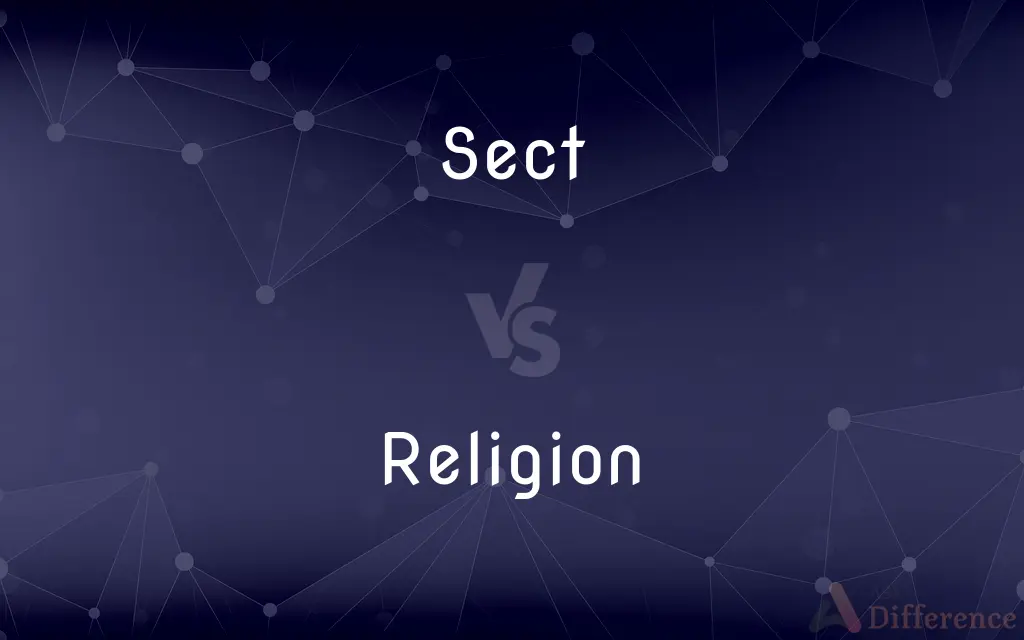Sect vs. Religion — What's the Difference?
By Tayyaba Rehman & Maham Liaqat — Updated on March 29, 2024
Sects are often subgroups within larger religious traditions, focusing on specific interpretations or practices, while religions are broader belief systems with established doctrines and practices.

Difference Between Sect and Religion
Table of Contents
ADVERTISEMENT
Key Differences
A sect typically emerges from within a larger religious context, highlighting distinct interpretations or practices that set it apart. On the other hand, a religion represents a comprehensive system of beliefs, practices, and organizational structures that defines a community's faith and worship.
Sects often prioritize purity and adherence to specific doctrines or practices, seeing themselves as true adherents of a religion's original teachings. Whereas religions encompass a wider range of beliefs and practices, allowing for more diversity within their adherents.
Membership in a sect is usually more exclusive, requiring a higher level of commitment and conformity to specific teachings. In contrast, religions generally have broader criteria for membership, welcoming a wider range of believers and levels of observance.
Sects frequently arise from a desire to reform or return to what is perceived as the foundational aspects of the faith. Meanwhile, religions may evolve over time, incorporating new interpretations and practices while maintaining core doctrines.
Sects can sometimes be seen as controversial or radical by the larger religious community from which they emerge due to their distinct beliefs or practices. Religions, however, are often recognized as the mainstream belief systems that hold a significant influence over cultural and societal norms.
ADVERTISEMENT
Comparison Chart
Definition
A subgroup within a religion with distinct beliefs.
A system of faith and worship.
Membership
Often exclusive, based on specific doctrines.
Generally inclusive, broader criteria.
Beliefs and Practices
Emphasizes purity and adherence to specific teachings.
Encompasses a wider range of doctrines and practices.
Origin
Arises from within a religion, seeking reform or return to original teachings.
Can be established independently, evolving over time.
Perception
May be viewed as controversial or radical by the larger religious community.
Recognized as mainstream, influencing societal norms.
Compare with Definitions
Sect
Characterized by strict adherence to specific religious practices.
Members of the sect observe fasting rigorously during their holy month.
Religion
A system of beliefs and practices around sacred things, uniting people into a moral community.
Christianity is a major world religion with diverse denominations.
Sect
Can be seen as controversial or radical from the perspective of the broader religious community.
The sect's unconventional beliefs have often put it at odds with mainstream religious authorities.
Religion
Organized and recognized structures of leadership and worship.
The religion's hierarchy ranges from local priests to a supreme religious leader.
Sect
A subgroup within a larger religious tradition focusing on particular doctrines.
The Amish sect is known for its simple living and resistance to modern technology.
Religion
Includes rituals, ethics, and a worldview that provides answers to existential questions.
The religion teaches compassion and forgiveness as central virtues.
Sect
Often formed as a result of a schism or desire to return to perceived original teachings.
The Lutheran sect was founded on the principles of Martin Luther's reformation efforts.
Religion
Broad in scope, allowing for a diversity of beliefs and practices within its framework.
The religion encompasses a wide range of doctrines, accommodating many schools of thought.
Sect
Membership usually requires a higher level of commitment.
Joining the sect involves a rigorous initiation process.
Religion
Influences cultural, social, and personal values and norms.
The religion's festivals are celebrated by millions around the globe, reflecting its cultural significance.
Sect
A sect is a subgroup of a religious, political, or philosophical belief system, usually an offshoot of a larger group. Although the term was originally a classification for religious separated groups, it can now refer to any organization that breaks away from a larger one to follow a different set of rules and principles.
Religion
Religion is a social-cultural system of designated behaviors and practices, morals, beliefs, worldviews, texts, sanctified places, prophecies, ethics, or organizations, that relates humanity to supernatural, transcendental, and spiritual elements; however, there is no scholarly consensus over what precisely constitutes a religion.Different religions may or may not contain various elements ranging from the divine, sacred things, faith, a supernatural being or supernatural beings or "some sort of ultimacy and transcendence that will provide norms and power for the rest of life". Religious practices may include rituals, sermons, commemoration or veneration (of deities and/or saints), sacrifices, festivals, feasts, trances, initiations, funerary services, matrimonial services, meditation, prayer, music, art, dance, public service, or other aspects of human culture.
Sect
A group of people forming a distinct unit within a larger group by virtue of certain refinements or distinctions of belief or practice.
Religion
The belief in and reverence for a supernatural power or powers, regarded as creating and governing the universe
Respect for religion.
Sect
A religious body, especially one that has separated from a larger denomination.
Religion
A particular variety of such belief, especially when organized into a system of doctrine and practice
The world's many religions.
Sect
A faction united by common interests or beliefs.
Religion
A set of beliefs, values, and practices based on the teachings of a spiritual leader.
Sect
An offshoot of a larger religion or denomination, usually and especially one with unorthodox or extreme political and/or religious beliefs.
A religious sect
Religion
The life or condition of a person in a religious order
A widow who went into religion and became a nun.
Sect
A group following a specific ideal or a leader.
Religion
A cause, principle, or activity pursued with zeal or conscientious devotion
A person for whom art became a religion.
Sect
(obsolete) A cutting; a scion.
Religion
(uncountable) Belief in a spiritual or metaphysical reality (often including at least one deity), accompanied by practices or rituals pertaining to the belief.
My brother tends to value religion, but my sister not as much.
Sect
A cutting; a scion.
Religion
(countable) A particular system of such belief, and the rituals and practices proper to it.
Belief system
Islam is a major religion, particularly in North Africa and Southwest Asia.
Mormonism is a new religion, while Zoroastrianism is an old one.
Sect
Those following a particular leader or authority, or attached to a certain opinion; a company or set having a common belief or allegiance distinct from others; in religion, the believers in a particular creed, or upholders of a particular practice; especially, in modern times, a party dissenting from an established church; a denomination; in philosophy, the disciples of a particular master; a school; in society and the state, an order, rank, class, or party.
He beareth the sign of poverty,And in that sect our Savior saved all mankind.
As of the sect of which that he was born,He kept his lay, to which that he was sworn.
The cursed sect of that detestable and false prophet Mohammed.
As concerning this sect [Christians], we know that everywhere it is spoken against.
Religion
(uncountable) The way of life committed to by monks and nuns.
The monk entered religion when he was 20 years of age.
Sect
A subdivision of a larger religious group
Religion
Rituals and actions associated with religious beliefs, but considered apart from them.
I think some Christians would love Jesus more if they weren't so stuck in religion.
Jack's spiritual, but he's not really into religion.
Sect
A dissenting clique
Religion
(countable) Any practice to which someone or some group is seriously devoted.
At this point, Star Trek has really become a religion.
Religion
Faithfulness to a given principle; conscientiousness.
Religion
Engage in religious practice.
Religion
Indoctrinate into a specific religion.
Religion
To make sacred or symbolic; sanctify.
Religion
The outward act or form by which men indicate their recognition of the existence of a god or of gods having power over their destiny, to whom obedience, service, and honor are due; the feeling or expression of human love, fear, or awe of some superhuman and overruling power, whether by profession of belief, by observance of rites and ceremonies, or by the conduct of life; a system of faith and worship; a manifestation of piety; as, ethical religions; monotheistic religions; natural religion; revealed religion; the religion of the Jews; the religion of idol worshipers.
An orderly life so far as others are able to observe us is now and then produced by prudential motives or by dint of habit; but without seriousness there can be no religious principle at the bottom, no course of conduct from religious motives; in a word, there can be no religion.
Religion [was] not, as too often now, used as equivalent for godliness; but . . . it expressed the outer form and embodiment which the inward spirit of a true or a false devotion assumed.
Religions, by which are meant the modes of divine worship proper to different tribes, nations, or communities, and based on the belief held in common by the members of them severally. . . . There is no living religion without something like a doctrine. On the other hand, a doctrine, however elaborate, does not constitute a religion.
Religion . . . means the conscious relation between man and God, and the expression of that relation in human conduct.
After the most straitest sect of our religion I lived a Pharisee.
The image of a brute, adornedWith gay religions full of pomp and gold.
Religion
Specifically, conformity in faith and life to the precepts inculcated in the Bible, respecting the conduct of life and duty toward God and man; the Christian faith and practice.
Let us with caution indulge the supposition that morality can be maintained without religion.
Religion will attend you . . . as a pleasant and useful companion in every proper place, and every temperate occupation of life.
Religion
A monastic or religious order subject to a regulated mode of life; the religious state; as, to enter religion.
A good man was there of religion.
Religion
Strictness of fidelity in conforming to any practice, as if it were an enjoined rule of conduct.
Those parts of pleading which in ancient times might perhaps be material, but at this time are become only mere styles and forms, are still continued with much religion.
Religion
A strong belief in a supernatural power or powers that control human destiny;
He lost his faith but not his morality
Religion
Institution to express belief in a divine power;
He was raised in the Baptist religion
A member of his own faith contradicted him
Common Curiosities
What defines a sect?
A sect is defined as a subgroup within a religion, emphasizing specific interpretations or practices that distinguish it from the broader tradition.
Is membership in a sect more demanding than in a religion?
Typically, yes, as sects usually require a higher level of commitment and adherence to specific teachings.
Why do sects form?
Sects often form from a desire to reform or return to what members believe are the original teachings of the faith.
What role do sects play within religions?
Sects can serve as catalysts for change, challenging and potentially enriching the larger religious tradition.
Can a sect become a religion?
Yes, over time, a sect can evolve into a recognized religion as it develops its own comprehensive system of beliefs and practices.
Can someone belong to both a religion and a sect?
Yes, individuals can identify with a broader religion while practicing within a specific sect that aligns more closely with their beliefs.
How do religions influence culture?
Religions shape cultural norms, values, and traditions, influencing everything from moral decisions to holidays and rituals.
How does a sect differ from a religion?
A sect is more exclusive and focused on particular doctrines or practices, whereas a religion is a broad system of faith that encompasses a wider range of beliefs.
How are new religions formed?
New religions can emerge independently, often founded by a charismatic leader or through the evolution of new beliefs and practices.
Are all sects radical?
Not necessarily. While some sects may hold radical views, others simply practice a more focused interpretation of their faith.
What challenges do sects face?
Sects often face challenges such as societal misunderstanding, persecution, or tension with the broader religious community from which they emerged.
What is the difference between a denomination and a sect?
A denomination is a recognized branch within a religion, often more mainstream and less exclusive than a sect.
How do sects affect the perception of a religion?
Sects can both positively and negatively affect the perception of a religion, depending on their beliefs and practices.
Why are some sects controversial?
Sects may be controversial due to their unconventional beliefs, practices, or their challenge to established religious authorities.
How do religions evolve over time?
Religions evolve through reinterpretation of doctrines, incorporation of new beliefs, and interaction with cultural and societal changes.
Share Your Discovery

Previous Comparison
Worm vs. Trojan
Next Comparison
Hive vs. BeelineAuthor Spotlight
Written by
Tayyaba RehmanTayyaba Rehman is a distinguished writer, currently serving as a primary contributor to askdifference.com. As a researcher in semantics and etymology, Tayyaba's passion for the complexity of languages and their distinctions has found a perfect home on the platform. Tayyaba delves into the intricacies of language, distinguishing between commonly confused words and phrases, thereby providing clarity for readers worldwide.
Co-written by
Maham Liaqat













































